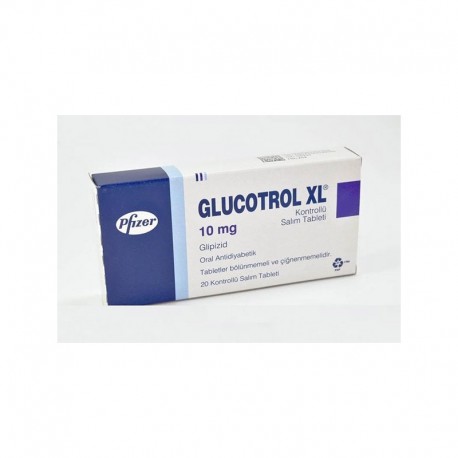No products
 View larger
View larger Glucotrol-XL 10 Mg 20 Tablets ingredient Glipizide
GLC4412
New product
| Quantity | Discount | You Save |
|---|---|---|
| 2 | 5% | Up to $2.39 |
| 3 | 10% | Up to $7.17 |
| 4 | 15% | Up to $14.34 |
| 5 | 20% | Up to $23.90 |
Glucotrol-XL 10 Mg 20 Tablets ingredient Glipizide
USAGE INSTRUCTIONS
GLUCOTROL XL 10 mg Controlled Release Tablets
478 Items
Volume discounts
| Quantity | Price | You Save |
|---|---|---|
| 2 | $27.00 | Up to $2.16 |
| 3 | $27.00 | Up to $6.48 |
| 4 | $27.00 | Up to $12.96 |
| 5 | $27.00 | Up to $21.60 |
More info
• If you have glucose-6-phosphate dehydrogenase (G6PD) deficiency. This usually comes from the family. Those with G6PD deficiency and those who use GLUCOTROL XL may develop hemolytic anemia (which causes abnormal breakdown of red blood cells). If
these warnings are valid for you, even at any time in the past, please consult with your doctor.
Use of GLUCOTROL XL with food and drink When used with alcohol, it may cause excessive blood glucose (so that it can reach a coma). Therefore, do not use alcohol.
Pregnancy Consult your doctor or pharmacist before using the medicine. If you are pregnant or do not plan to become pregnant, do not use GLUCOTROL XL If you discover that you are pregnant during your treatment, consult your doctor or pharmacist immediately.
Breastfeeding Consult your doctor or pharmacist before using the medicine. It is not known whether GLUCOTROL XL passes into breast milk. Do not use GLUCOTROL XL if you are breastfeeding.
When you feel dizziness, tremors, irritability, sweating, drowsiness, palpitations, difficulty concentrating, they can be signs of hypoglycemia. In this case, you should not use a vehicle or machine.
Use with other drugs The following medicines may reduce your blood sugar considerably when used in combination with GLUCOTROL XL:
• some medicines that treat fungal infections (such as miconazole, fluconazole, voriconazole)
• non-steroidal anti-inflammatory drugs (used for muscle and joint pain) (phenylbutazone) etc.)
• salicylates (such as aspirin)
• beta blocker drugs (high blood pressure and is used to treat certain cardiac diseases)
• angiotensin converting enzyme inhibitors (used to treat high blood pressure)
• cimetidine (gastric and used in intestinal ulcers)
• sulfonamides or chloramphenicol (in the treatment of bacterial infections used),
• monoamine oxidase inhibitors (used to treat depression)
• probenecid (gout treatment drugs used in)
• coumarin anticoagulants (to prevent the formation of blood clots, eg. warfarin)
• fibrates (high cholesterol are treated also be used, eg, clofibrate)
The following drugs also tend to increase blood
sugar:• phenothiazine taken in high doses (used in psychiatric treatment)
• corticosteroids
• sympathomimetic drugs (e.g., for treating asthma isoprenaline, salbutamol)
3
• thiazides or other diuretics (diuretic drugs)
• drugs used in the treatment of thyroid hormones
• hormonal agents that include oral contraceptives (estrogen, progestogen and contraceptive pills) and hormone replacement therapy
• phenytoin (used in the treatment of epilepsy)
• nicotinic acid (used to lower cholesterol and other lipid levels)
• calcium channel blocking drugs (used in heart attack and high blood pressure)
• isoniazid (used in the treatment of tuberculosis)
• danazol (a hormone therapy)
If you are currently using any prescription or non-prescription medicine, or if you have used it recently please inform your doctor or pharmacist.

